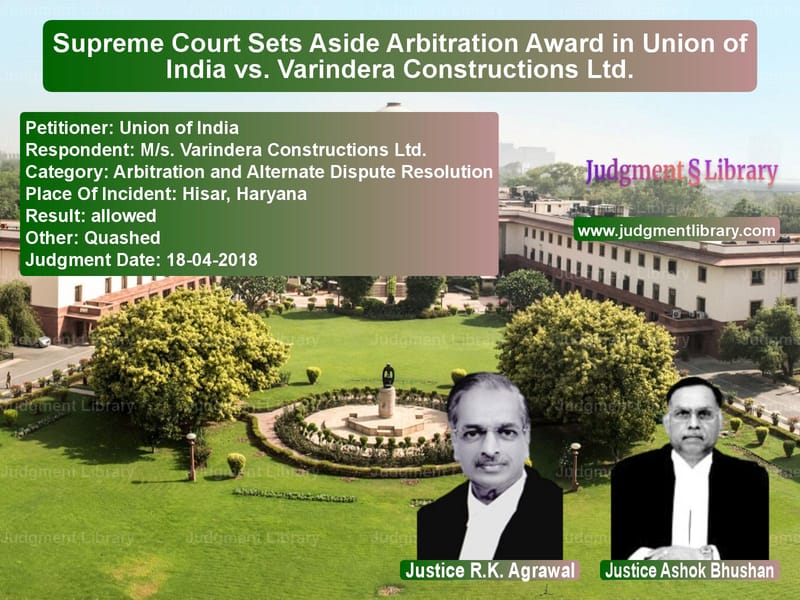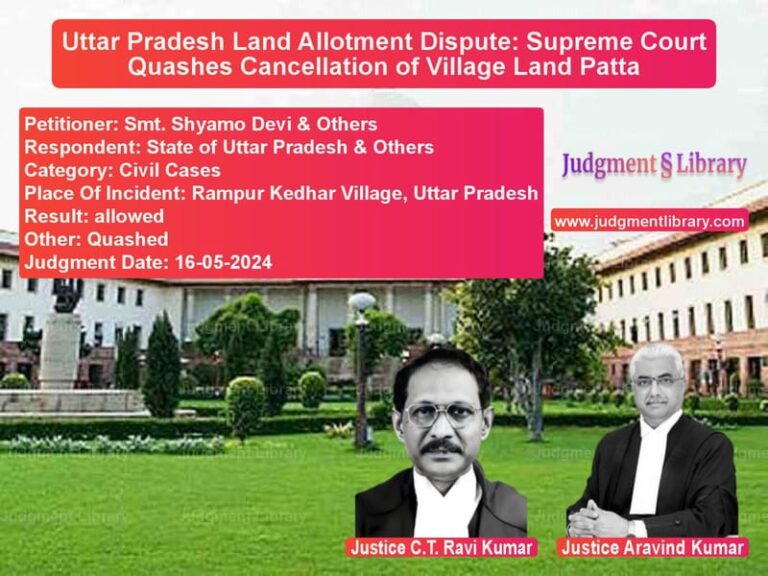Supreme Court Sets Aside Arbitration Award in Union of India vs. Varindera Constructions Ltd.
The Supreme Court of India recently ruled on a significant arbitration dispute in Union of India v. M/s. Varindera Constructions Ltd.. The case revolved around whether an arbitration award granting wage escalation to the contractor was contrary to the terms of the contract. The Court ruled in favor of the Union of India, holding that the arbitrator’s award was contrary to the express provisions of the contract and could not be sustained.
Background of the Case
The dispute arose from two construction contracts awarded by the Union of India to M/s. Varindera Constructions Ltd. for the construction of residential accommodations at Hisar. The contracts contained a clause explicitly stating that no escalation or reimbursement would be made for an increase in wages or material prices during the execution of the work.
Key Facts:
- The tenders for the construction contracts were floated on October 30, 2006.
- The respondent, M/s. Varindera Constructions Ltd., was awarded the contract as the lowest bidder.
- The contracts were valued at Rs. 39.09 crore and Rs. 35.21 crore, respectively.
- Construction work commenced on March 20, 2007 and was completed within the extended timeline.
- The contractor submitted the final bill, which included claims for additional amounts due to an increase in minimum wages notified by the Haryana Government.
- The Union of India rejected these claims, citing Clause 19 of the contract, which explicitly prohibited escalation reimbursements.
- The dispute was referred to arbitration, where the arbitrator awarded additional compensation to the contractor.
- The Union of India challenged the award before the Delhi High Court, which upheld the arbitrator’s decision.
- Aggrieved by the High Court’s ruling, the Union of India filed an appeal before the Supreme Court.
Petitioner’s (Union of India) Arguments
- The Union of India contended that Clause 19 of the contract expressly barred escalation reimbursements for labor wages, material costs, or any other expenses.
- The contract specifically required bidders to factor in possible cost increases when quoting their rates.
- The arbitrator’s award disregarded this contractual limitation and was therefore contrary to the express terms of the agreement.
- The Delhi High Court erred in upholding the arbitrator’s award, as it effectively rewrote the contract by introducing reimbursement obligations that were never agreed upon.
Respondent’s (M/s. Varindera Constructions Ltd.) Arguments
- The contractor argued that the increase in minimum wages was a statutory requirement, not an unforeseen escalation.
- They contended that under Clause 6.3 of the contract, the employer was required to ensure compliance with labor laws, which included adjustments for minimum wage increases.
- The arbitrator acted within his jurisdiction in interpreting the contract in a manner that ensured fair compensation.
- The Delhi High Court correctly upheld the arbitrator’s award, as it was based on a reasonable interpretation of contractual obligations.
Supreme Court’s Observations
The Supreme Court examined the contract clauses and found that the arbitrator’s award was unsustainable. Key observations included:
- “Clause 19 explicitly states that no escalation, reimbursement whatsoever shall be made for increases in wages, material prices, or other costs.”
- “The word ‘whatsoever’ used in Clause 19 indicates that the prohibition on escalation reimbursements is absolute.”
- “The arbitrator exceeded his jurisdiction by ignoring Clause 19 and awarding compensation for increased wages.”
- “Courts should not intervene in contractual terms unless they violate statutory provisions or are manifestly arbitrary.”
Key Legal Precedents Considered
- ONGC Ltd. v. Saw Pipes Ltd. (2003) – Held that an arbitral award that violates express contractual terms can be set aside as being against public policy.
- State of Rajasthan v. Ferro Concrete Construction (2009) – Reaffirmed that courts cannot modify contracts through arbitration.
- Delhi Development Authority v. R.S. Sharma & Co. (2008) – Stated that an award must be set aside if it is contrary to the express provisions of a contract.
Final Judgment
The Supreme Court set aside the High Court’s ruling and annulled the arbitrator’s award. The Court ruled:
“The arbitrator’s award is contrary to Clause 19 of the contract, which explicitly bars escalation reimbursements. The High Court erred in upholding an award that violates the express terms of the contract.”
The Court held that the contractor was not entitled to claim additional compensation for increased wages and directed both parties to bear their own legal costs.
Significance of the Judgment
This ruling establishes key principles for arbitration and contract enforcement:
- Enforcement of Contract Terms: The judgment reinforces that arbitration cannot override express contractual provisions.
- Limits of Arbitrator’s Authority: Arbitrators must act within the boundaries of the contract and cannot introduce new obligations.
- Judicial Review of Arbitral Awards: Courts can intervene when an arbitral award contradicts the terms of the contract.
Conclusion
The Supreme Court’s ruling in this case underscores the importance of strict adherence to contractual terms. By setting aside an award that violated an explicit prohibition on wage escalation reimbursements, the judgment ensures that arbitration remains a mechanism for dispute resolution rather than contract modification.
Petitioner Name: Union of India.Respondent Name: M/s. Varindera Constructions Ltd..Judgment By: Justice R.K. Agrawal, Justice Ashok Bhushan.Place Of Incident: Hisar, Haryana.Judgment Date: 18-04-2018.
Don’t miss out on the full details! Download the complete judgment in PDF format below and gain valuable insights instantly!
Download Judgment: Union of India vs Ms. Varindera Const Supreme Court of India Judgment Dated 18-04-2018.pdf
Direct Downlaod Judgment: Direct downlaod this Judgment
See all petitions in Arbitration Awards
See all petitions in Enforcement of Awards
See all petitions in Contract Disputes
See all petitions in Judgment by R K Agrawal
See all petitions in Judgment by Ashok Bhushan
See all petitions in allowed
See all petitions in Quashed
See all petitions in supreme court of India judgments April 2018
See all petitions in 2018 judgments
See all posts in Arbitration and Alternate Dispute Resolution Category
See all allowed petitions in Arbitration and Alternate Dispute Resolution Category
See all Dismissed petitions in Arbitration and Alternate Dispute Resolution Category
See all partially allowed petitions in Arbitration and Alternate Dispute Resolution Category







